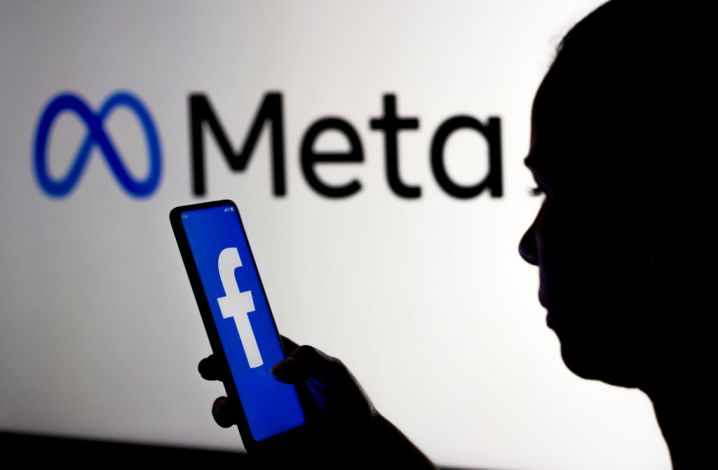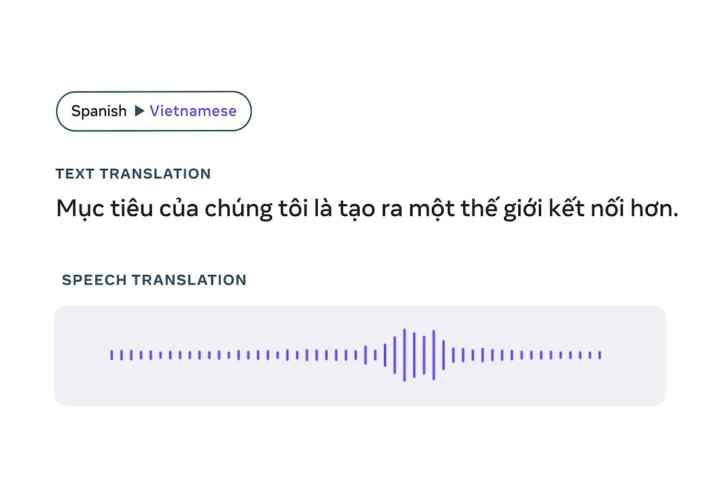Meta is building a space-age ‘universal language translator’
Meta has just announced it is building an AI translation tool that can convert over 100 languages in a variety of different ways. Will it beat the competition?

By
Alex Blake
August 23, 2023 6:19AM 
When you think of tools infused with artificial intelligence (AI) these days, it’s natural for ChatGPT and Bing Chat to spring to mind. But Facebook owner Meta wants to change that with SeamlessM4T, an AI-powered “universal language translator” that could instantly convert any language in the world into whatever output you want.
Meta describes SeamlessM4T as “the first all-in-one multilingual multimodal AI translation and transcription model.” That’s quite a mouthful, but in simple terms, it means it can convert languages in a range of different ways, such as taking speech audio and switching it into text in a different tongue.
 SOPA Images / Getty Images
SOPA Images / Getty ImagesAccording to Meta, the tool’s speech recognition and translation features can work in a few different ways:
• Speech recognition for nearly 100 languages
• Speech-to-text translation for nearly 100 input and output languages
• Speech-to-speech translation for nearly 100 input languages and 36 output languages (including English)
• Text-to-text translation for nearly 100 languages
• Text-to-speech translation for nearly 100 input languages and 35 output languages (including English)
Meta says this will “allow people to communicate effortlessly through speech and text across different languages.”
Coming soon to Facebook?
 Meta
MetaSeamlessM4T is being released under a research license, and Meta states it’s doing this to “allow researchers and developers to build on this work.” As well as that, the metadata of the dataset that was used to train the translation model, called SeamlessAlign, is also being publicly released. This consists of “270,000 hours of mined speech and text alignments,” Meta claims.
However, Meta did not make it clear where these 270,000 hours of “mined speech” have been sourced. Concerns have been raised over the privacy implications of Meta’s work on AI chatbots, while other AI tools have already been caught stealing protected work. There will no doubt be fears that Meta could have done something similar when it trained SeamlessM4T.
There are already other translation tools like Google Translate that can convert text to text and speech to text, but Meta says its own efforts are superior. SeamlessM4T, Meta argues, “reduces errors and delays, increasing the efficiency and quality of the translation process.”
Meta has not said whether the new tool will be integrated into its apps like Facebook and Instagram, but the company did reveal that it aimed to “explore how this foundational model can enable new communication capabilities” in the future. We’ll have to see what that entails.
Editors' Recommendations
Google Bard could soon become your new AI life coach Wix uses ChatGPT to help you quickly build an entire website Elon Musk’s new AI company aims to ‘understand the universe’ Google tells workers to be wary of AI chatbots What is MusicLM? Check out Google’s text-to-music AIIn ancient times, people like Alex would have been shunned for their nerdy ways and strange opinions on cheese. Today, he…
Google’s ChatGPT rival just launched in search. Here’s how to try it
Ever since Microsoft started integrating ChatGPT into Bing search, alarm bells have been ringing at Google. Now, though, the tech giant has started rolling out its own generative artificial intelligence (AI) tool for users as part of its bid to retain its search crown.
In a blog post, the company explains that the new feature (called Search Generative Experience, or SGE) is part of Google’s Search Labs, which lets you test out experimental ideas in Google search and provide feedback to the company. Google says its generative AI will “help you take some of the work out of searching, so you can understand a topic faster, uncover new viewpoints and insights and get things done more easily.”
Google’s AI image-detection tool feels like it could work
Google announced during its I/O developers conference on Wednesday its plans to launch a tool that will distinguish whether images that show up in its search results are AI-generated images.
With the increasing popularity of AI-generated content, there is a need to confirm whether the content is authentic -- as in created by humans -- or if it has been developed by AI.
Meta to introduce AI agents to ‘billions of people’
Meta chief Mark Zuckerberg said that recent advances in artificial technology present an “opportunity to introduce AI agents to billions of people in ways that will be useful and meaningful.”
The Zuck made the remarks during a call with investors on Wednesday following Meta’s release of company data for the first quarter.

 JimMin
JimMin 





























.jpg&h=630&w=1200&q=100&v=f776164e2b&c=1)






.jpg)